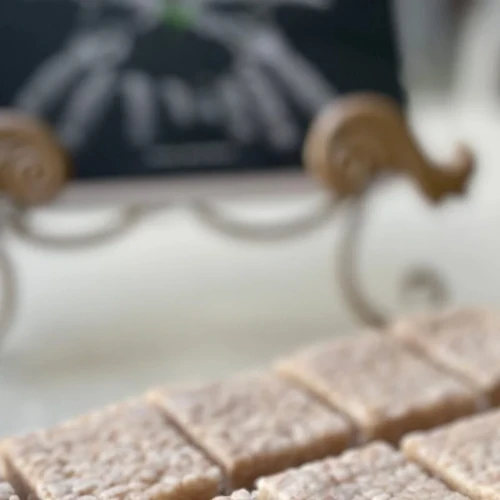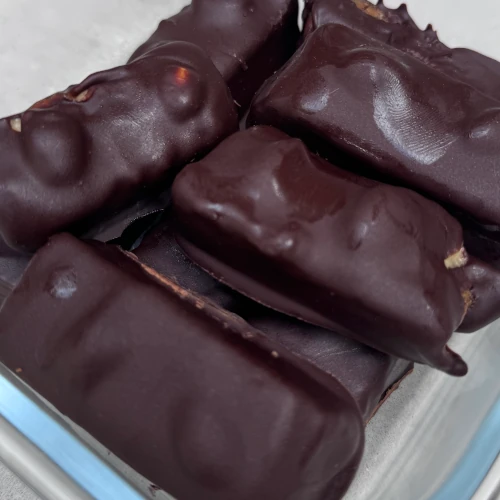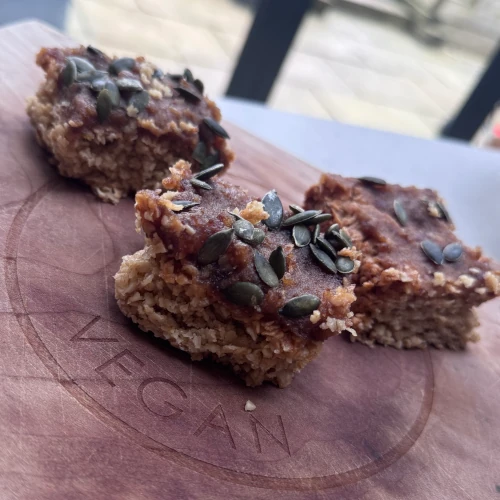
Plant-Based Rice Cakes Recipe: The Ultimate Endurance Fuel
The original rice cakes date backs to Dr Allen Lim (sports physiologist, coach, and Skratch Labs founder) when he started using rice cookers in pro cycling.
Ingredients
- 1 litre water
- 200g creamed coconut (block)
- 30g (2 tbsp) sugar
- 1 tsp vanilla extract
- Optional: 1tsp cinnamon
Instructions
- Place all the ingredients into a rice cooker and cook according to your machine's instructions.
- When cooked, mix everything until it is smooth and spoon the hot mixture into an airtight zip-fastener freezer bag (size large or medium, depending on the brand); flatten out to roughly 4cm deep and smooth the air out.
- Once cool, refrigerate overnight.
- Remove carefully from the bag, cut into approximately 20 squares and keep in an airtight container in the fridge.
- If refrigerated, they will keep for about four days.
Notes
You can make these rice cakes without a rice cooker (I did), but according to the author, it doesn't turn out as good. Mines were pretty awesome.
Nutrition Information:
Yield: 20 Serving Size: 1Amount Per Serving: Calories: 20Total Fat: 1gSaturated Fat: 1gTrans Fat: 0gUnsaturated Fat: 0gCholesterol: 0mgSodium: 14mgCarbohydrates: 2gFiber: 0gSugar: 2gProtein: 0g
If you’ve spent time around cyclists or triathletes, you’ve likely seen foil-wrapped squares handed around during long rides. Those are rice cakes—compact blocks of carbs with a bit of salt and flavour—popularised in the pro peloton because they’re easy on the gut, easy to portion, and still appealing when you’re several hours deep.
Why cyclists swear by them
Endurance fueling has three key jobs: delivering carbohydrates your gut can absorb quickly, maintaining electrolyte levels, and preventing GI distress. Rice cakes excel at all three.
-
Fast, gentle carbs. Short-grain “sticky” rice is rich in amylopectin, a starch that breaks down quickly—perfect when you’re aiming for ~60–90 g of carbs per hour (more if you’ve trained your gut). Because rice cakes are low in fat and fibre, they’re less likely to cause sloshing or reflux than heavier foods.
-
Electrolyte support. A pinch of sodium (from salt, soy sauce, or miso) helps with fluid retention and supports carbohydrate transport in the small intestine.
-
Palatability under stress. Long days can make ultra-sweet gels feel cloying. Rice cakes offer a neutral, satisfying chew that encourages consistent eating—the most essential fueling habit of all.
What makes rice such a good base?
White rice is essentially pure carbohydrate with minimal fibre and almost no FODMAPs, so it’s famously gut-friendly. Its mild flavour plays nicely with both sweet and savoury profiles, and the sticky texture compresses into tidy, pocket-proof portions that don’t crumble. From a performance angle, the main benefit isn’t micronutrients; it’s reliable, rapid glucose delivery to working muscles. Thoughtful add-ins—maple syrup or date paste for density, a light sprinkle of salted nuts or seeds for crunch and sodium—let you tailor taste and texture without sacrificing digestibility.
How athletes use them
Treat each square as a predictable “carb unit.” Depending on size, a typical piece provides roughly 25–35 g of carbohydrate. For endurance rides, many athletes target 2–3 pieces per hour, sipping fluids alongside. In hot conditions, increase sodium slightly and consider smaller, more frequent bites. For palate variety, alternate sweet and savoury hours (e.g., maple-cinnamon one hour, miso-sesame the next).
Plant-based by design
Rice cakes are naturally easy to keep vegan. The base is rice, water, and salt; cohesion and flavour come from plant-based choices like maple or coconut sugar, miso, tahini, peanut butter powder, cocoa, dried fruit, citrus zest, toasted seeds, or chopped roasted peanuts. Keep fats modest if you need quicker gastric emptying; add a bit more for longer, lower-intensity efforts when comfort food matters as much as speed.
Practical advantages you’ll appreciate
-
Cost-effective: Pennies per serving compared with packaged bars.
-
Customisable: Dial sweetness, sodium, chewiness, and flavour to your gut and conditions.
-
Real-food feel: Many athletes simply eat more—more consistently—when their fuel tastes like real food.
-
Plan-friendly: Easy to scale for a training week and to portion for specific carb targets.
Storage and food-safety notes
Because rice is moist and low-acid, basic food safety matters. Keep portions chilled until you roll out, and use insulated pockets or a small cooler on hot days. If you include fresh fruit purées, eat those pieces earlier in the ride. As with any new fuel, test at endurance pace before race day.
Bottom line: Plant-based rice cakes deliver fast carbs, steady sodium, and reliable gut comfort in a format that’s cheap, portable, and genuinely enjoyable. Whether you’re stacking base miles or ripping intervals, these little squares make it easier to hit your hourly carbohydrate targets—so you ride longer, finish stronger, and actually look forward to your next bite.







